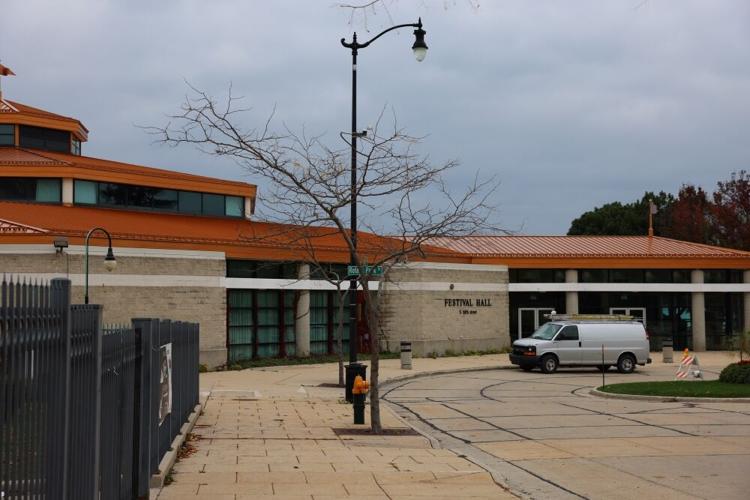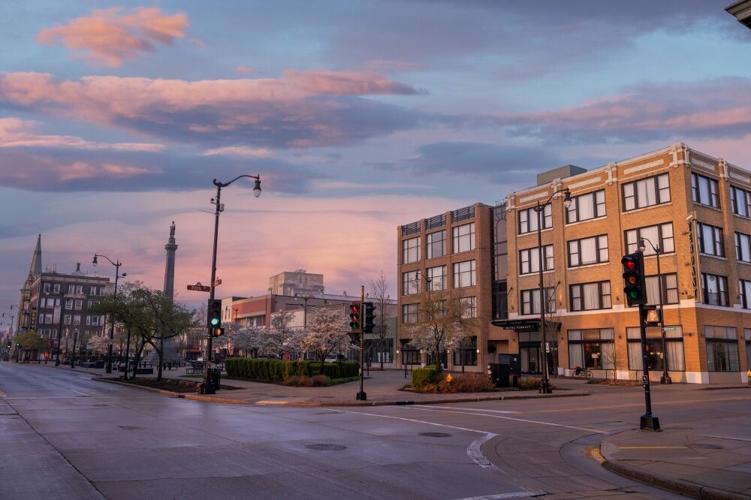Caroline Neal
RACINE — Downtown Racine residents may have noticed more statewide conferences and other large gatherings in the city.
Some business owners and leaders attribute this uptick to recent developments in the area, such as Hotel Verdant, as well as the new management at Festival Park.
The addition of these facilities, they say, give the city the capacity to host large events.
Since September, Downtown Racine has hosted statewide conferences including Wisconsin Economic Development Corporation’s Downtown Development Placemaking Workshop and the Wisconsin Public Transportation Annual Fall Conference.
“I think for people who have not been to Downtown Racine from across the state, (they) don’t realize what a gem it is — the proximity, the walkability,” said Kelly Kruse, executive director of Downtown Racine Corporation. “The architecture is probably some of the best in the state when it comes to our historic buildings.”
Kruse said the WEDC’s training conference brought together more than 40 downtown directors and board members from across the state in September.
Kruse said that in 2021, Racine hosted a regional one-day workshop but had not hosted a statewide training.
Christopher Adams, developer for Hotel Verdant, said the boutique hotel has 80 rooms, adding about 40% more rooms to the downtown area when combined with the DoubleTree.
When these conferences come to town, Adams said he sees an increase in business.
“When we had the transit event in October, both hotels, I believe, were (at) 100% occupancy,” he said.
Although he said there’s not really a “standard day” because the day of week and time of year can affect occupancy, Downtown Racine hosting an event is “definitely helpful,” Adams said.
Trevor Jung, transit and mobility director for RYDE Racine, said the group volunteered to host the Wisconsin Public Transportation Annual Fall Conference last month.
The conference brought more than 200 transit professionals to Downtown Racine and Memorial Hall.
“But the only reason that we were able to put our hand in the air and bring this event to Racine … was because of the ecosystem that now allows for it in downtown,” he said.
Patrick Flynn is the founder of 5k Events, which is general manager of Festival Park.
Since Flynn took over management, Festival Park has hosted political events for both Republican and Democratic figures.
In June, President-elect Donald Trump spoke at Festival Park.
Minnesota Gov. Tim Walz rallied supporters in October at Memorial Hall; a week later, Vice President-elect JD Vance also addressed a crowd in Memorial Hall.
“Everybody benefits from those events, not just us,” said Kevin MacDougall, Festival Park’s director of sales. “The spider web extends out into the community. We all work together because it’s in everybody’s best interest to make the downtown vibrant. Whether we’re hosting an event, we help the DRC promote their event and vice versa. It’s not competitive at all. It’s collaborative.”
Adams said Hotel Verdant coordinates with other businesses on “an ongoing basis” to accommodate their needs.
“I’ve been reaching out to businesses in downtown and trying to see how we can work together with different folks,” he said.
Tamara LoPiparo, owner of The Maple Table, believes the economic effect is a “rising tide raises all ships” situation.
“Hopefully, the economic impact of these events will encourage people to spend not only in the bars and restaurants, but also all the wonderful little shops we have,” she said.
For Kruse, these conferences might help increase foot traffic during the week, when small businesses have fewer people walking through their doors. Often, she said, these conferences occur during non-summer months, which can also be challenging periods for small businesses.
“Having the influx of people from out of town that have money to spend on going out to eat, maybe doing some shopping that they weren’t expecting on their lunch break while they’re here for a conference — all of these things can play a major impact,” she said.
Red Onion Cafe’s owner Corey Oakland said that although his business is “fortunate” to be busy on the weekends and weekdays, he believes these conferences can have an impact beyond the event itself.
“One of the things that I always say I really miss, as an example, would be when the triathlon was in the area,” Oakland said. “We literally got to know people from around the world that would be here. You’d see them once or twice a year. They’d come in, and you’d, in a way, get to know these people.”
Having large events in town that fill up the hotels can have a positive impact for the cafe as it would encourage people to grab a coffee or stop in for lunch, he said.
“You can’t deny that if you bring several hundred people into a downtown area, it’s going to have a positive impact,” Oakland said. “Not every store may feel that impact, but it’s definitely sort of a trickle down situation.”
Still, he said Racine’s location in between Chicago and Milwaukee can make it challenging for the city to compete as a host.
Oakland also said that Racine’s distance from the interstate isolates it, which could be a drawback for companies trying to make transportation to a convention easier.
“As somebody who’s lived here for many, many years, it’s not a huge issue,” he said. “But for somebody who’s considering a convention, that might be something of a barrier.”
This, he said, is why Racine’s location on Lake Michigan is important.
“It’s worth the 20 minute drive from the freeway to see where we’re situated on the lake,” Oakland said.
Adams, like Oakland, said Racine’s spot on Lake Michigan — as well as the Root River, the marina and the historic downtown — makes the city a good location for conferences.
“It’s a quaint, mid-sized city that a lot of people haven’t seen before. It’s got a lot going for it,” he said.
Kruse said the historic element of Downtown Racine’s architecture still remains because of the city’s strict codes.
And while these requirements can be frustrating for new property and business owners, Kruse said the codes have been a “blessing.”
“It certainly makes a big difference on the overall aesthetic,” she said.
Kruse said the walkability of downtown also is a draw for Racine — a belief shared by LoPiparo.
Whereas bigger cities like Milwaukee can be tough to navigate, in Racine “everything’s just a couple of footsteps away,” LoPiparo said.
“Some of these people coming in, if they’re staying at (Hotel) Verdant or DoubleTree, they might not even necessarily need a rental car because they can walk to all the restaurants, they can walk to Festival Hall,” she said. “Everything is there for them.”
The variety of Racine’s restaurants is another benefit for the city.
“We have so many restaurants, which when you are traveling, restaurants and being a foodie is a big deal. Having the array of restaurants and hospitality that we have is great,” Kruse said. “It’s really exciting that we finally have everything that we need to be a host city.”
For the WEDC conference, Kruse said DRC made sure visitors had the necessary information in their welcome bags, including a downtown visitors guide as well as a list of open restaurants and the self-guided walking tours and day trips.
“Not only were we able to have that foot traffic those days that they were in town, but giving them a reason to come back is really important,” Kruse said. “So that we’re really making that connection. Not just, ‘Hey, thanks for coming by,’ but we’re working directly with all of these and saying, ‘Here’s a reason to come back.’”







No comments:
Post a Comment